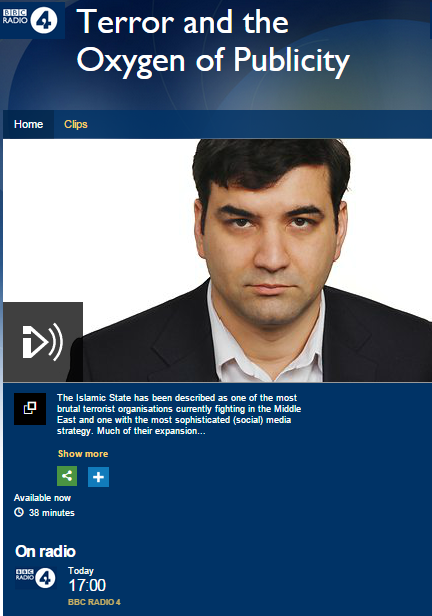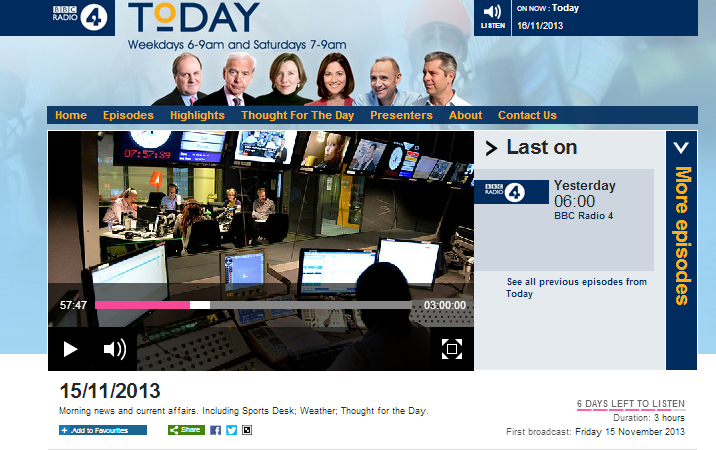On December 22nd BBC Radio 4 broadcast a programme called “Terror and the Oxygen of Publicity” made by the BBC’s security correspondent Gordon Corera. The broadcast is available here and individual clips from the programme have also been put online here.
According to the programme’s synopsis, it “examines the jihadists’ social media strategy, the attempts to combat it, and how media organisations tread the fine line of giving publicity to terrorists and reporting the news”. Near the beginning of the broadcast Corera states that his aim is “to ask what the media and government can and should do”.
There is much of interest in Corera’s programme but one topic he does not address is that of the media’s use of language when reporting on terrorism. As BBC Watch readers are doubtless aware, that subject is a particularly pertinent one in relation to the corporation itself as it regularly employs double standards regarding the use of the word terrorism and by doing so communicates to its audiences which political violence it regards as terror and which – due to its own political motivations – it does not. Ironically, listeners heard a small example of that phenomenon early on in this programme.
Corera’s introduction to the topic of what he describes as the “relationship between terror and modern media” comes through the example of the Dawson’s Field hijackings in 1970 which he describes thus:
“A Palestinian group called the PFLP had simultaneously hijacked a number of passenger planes and then flown them to a landing strip in the middle of the Jordanian desert known as Dawson’s Field.”
He later states:
“The PFLP’s spectacular act was intended to capture the world’s attention. They wanted the release of political prisoners held by Israel in return for the hostages…” [emphasis added]
By describing members of an internationally designated Marxist-Leninist terrorist organization as ‘political prisoners’ Corera of course promotes a stance which speaks volumes about his own approach to the subject of PFLP terrorism. But as well as the obvious impartiality issue raised by the use of that phrase, Corera also fails on accuracy.
The Dawson’s Field hijackers did indeed demand the release of prisoners held in Israel, but – as shown in US State Department cables from the time – the PFLP’s primary demand was for the release of prisoners held in three other countries.
“The Popular Front for the Liberation of Palestine has issued a 72-hour ultimatum to the Swiss Government to release three Palestinian Commandos currently serving 12 year sentences in Switzerland for attacking an Israeli airliner in Zurich in 1969.”
Those prisoners were not incarcerated for ‘political’ reasons but due to their having launched a terror attack.
“On February 18, 1969 El Al flight 432, on its way from Amsterdam to Tel Aviv via Zurich, was due to take off at Zurich International Airport. While slowly advancing toward the take-off starting point, the plane was attacked by four terrorists, who opened automatic fire and hurled demolition charges at the aircraft.”
A later US State Department cable states:
“According to news reports, the PFLP has made three demands for release of the aircraft and passengers: 1) release and return to Amman of three PFLP commandos imprisoned in Switzerland; 2) return to Amman of the commando killed in the abortive El Al hijacking and release of his female accomplice; and 3) release of three fedayeen being held in West Germany. A fourth demand, relayed by the PFLP office in Beirut, calls for the release of all fedayeen held in Israel.”
That “female accomplice” was terrorist Leila Khaled who, together with Patrick Argüello, tried to hijack an El Al plane as part of the Dawson’s Field operation. The three terrorists imprisoned in West Germany had carried out an attack on a bus carrying El Al passengers at Munich airport on February 10th 1970, killing one person and wounding 11 others.
The provision of the “oxygen of publicity” for terrorists by the mainstream media and on social media is certainly an interesting topic for discussion. No less crucial to that debate, however, is the issue of how the mainstream media picks and chooses its terrorists and the way in which journalists’ own political opinions affect their portrayal of terrorism to the wider world – as seen in this example unintentionally provided by Gordon Corera.
At the beginning of the programme Corera informs listeners that:
“Here in the newsroom some of the toughest decisions relate to how we cover the subject of terrorism – even the use of the ‘T-word’ itself.”
Having set out to ask “what the media […] can and should do”, it is clear that a topic awaits for a sequel to Corera’s programme.
Related Articles:
Debate widens on BBC avoidance of the word terrorist
Mapping the BBC’s inconsistent use of the word ‘terror’




